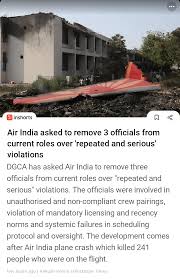
Introduction
The aviation industry has been under significant scrutiny in recent years, particularly in light of safety and operational regulations that ensure efficiency and responsibility. Air India, once a prestigious airline, is facing problems that have prompted regulatory authorities to take decisive measures. Recently, three officials from the airline were ordered to be removed from their positions due to crew scheduling violations, emphasizing the significance of adhering to aviation protocols.
Details of the Violations
The Directorate General of Civil Aviation (DGCA) of India reported the violations as a critical infringement of established guidelines designed to ensure safety and effective personnel management. These violations were discovered after multiple complaints surfaced regarding the irregular scheduling of flight crews, which resulted in both safety concerns and operational inefficiencies. The DGCA pointed out that under-regulated crew schedules can lead to fatigue among pilots and cabin crew, potentially jeopardizing passenger safety.
Recent Events
This situation arose following Air India’s attempt to revamp its operations to regain lost flight schedules amid increasing competition from domestic and international airlines. In recent months, the airline has been focused on enhancing its service quality, especially as it has seen an uptick in passenger demand following the global pandemic. However, the crew scheduling issues were not only a legal concern, but they also caught the attention of the public, raising further inquiries into the airline’s operational standards.
The DGCA’s order specifically identifies the involvement of three key officials responsible for the scheduling anomalies, highlighting the airline’s need for stricter governance. These actions reflect a growing trend among regulatory bodies worldwide to enforce accountability among airline personnel, especially in markets that are witnessing a recovery after major disruptions.
Conclusion
The removal of these officials marks a crucial step for Air India and serves as a reminder of the critical importance of regulatory compliance in the aviation sector. As airlines navigate the post-pandemic recovery phase, operational accountability is paramount to maintaining safety standards and restoring public trust. Future developments will likely focus on strengthening personnel training and adherence to scheduling protocols. With increased scrutiny from aviation authorities, airlines must ensure that crew scheduling remains diligent, as mismanagement can lead to serious implications for both airline operations and passenger safety. The incident showcases the ongoing evolution of standards in the aviation industry, where vigilance and adherence can prevent future violations.



